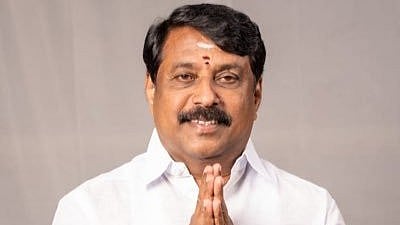
Tamil Nadu BJP chief Nainar Nagenthiran
Credit: X/@NainarBJP
Chennai: Tamil Nadu BJP chief Nainar Nagenthiran’s recent remarks that the party’s intention is to abolish the Hindu Religious and Charitable Endowments (HR & CE) department if the National Democratic Alliance (NDA) assumes power in 2026 have put the AIADMK in a tight spot.
Nagenthiran’s statement is expected to be the next flashpoint between the two parties – AIADMK and BJP – who have already been sparring over the composition of the government to be formed after elections. While the AIADMK insists it will form a government on its own, the BJP, especially Union Home Minister Amit Shah, maintains it will be a coalition dispensation.
The statement comes at a time when the NDA is making a concerted effort to show that it is an undivided house with AIADMK general secretary Edappadi K Palaniswami and former TN BJP chief K Annamalai, who share a strained relationship, appearing together on a stage for the first time after the two parties revived their alliance in April 2025.
Questions about the alliance’s cohesiveness continue to be raised due to differences between its constituents but the presence of leaders from NDA and its potential allies at the death anniversary of late Congress leader G K Moopanar – whose TMC is now part of the NDA – on August 30 sent a positive signal.
However, Nagenthiran’s statement made the same evening at an event demanding temples be freed of government control might unsettle the AIADMK.
“BJP’s stand is that there should be no Hindu Religious and Charitable Endowments (HR & CE) department. When we come to power in 2026, our intention is that the HR&CE department should not exist,” Nagenthiran said.
The development comes two months after Palaniswami came under intense attack from various quarters for questioning the DMK government over establishing new colleges using temple funds. This remark prompted many to ask whether the AIADMK was withering away from its Dravidian principles to please the BJP.
The latest statement by Nagenthiran is among the growing list of issues over which the two alliance partners don’t have a converging view. Already, Union Minister of State L Murugan has been maintaining that the three-language policy and National Education Policy will be implemented in Tamil Nadu after 2026.
If the BJP leaders continue to make such statements, they will only end up providing fodder to the DMK and its allies to criticise the AIADMK on issues that are integral to Dravidian politics. Such divergent views on crucial issues might affect the alliance on the ground, political observers say.
Though there have been demands to free temples from government control, the campaign has not yet received widespread support from the people.
The HR & CE department is in fact a product of the Dravidian movement with the then ruling Justice Party passing the Madras Hindu Religious Endowments Act of 1923 which paved the way for the establishment of Hindu Religious Endowments Board in 1925.
The successive governments after India’s independence built on the above legislation to enact the Tamil Nadu HR&CE Act, 1959, which is still in force. The AIADMK has also used temple funds to build colleges and set up educational institutions.
Prof Ramu Manivannan, former professor of political science at the University of Madras, told DH that the HR & CE department is a product of the historical struggle and the BJP will only ask for its revival if it continues to talk about such issues.
“It is a political flashpoint, and the BJP is sharpening its ideological edges. The point here is that it is a cliffhanger relationship, and the BJP is merely reiterating its ideological stance. AIADMK is well within its rights to stand up and say No. But the fact remains that the alliance is not based on ideology,” he added.